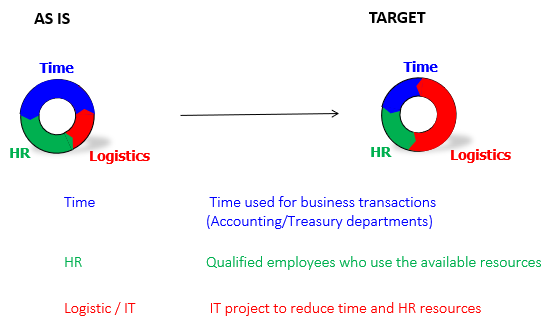TOMATO CATCH-UP - Newsletter Issue 249 – September 2022
Your monthly resource on working capital, process optimization, and issues related to the world of corporate treasurers, IT professionals, and bankers!
This newsletter is bilingual, English or German or also French depending on the source.
Introduction
Welcome back from vacation! Summer, with its extreme heat waves in central Europe, was also marked by inflation, supply shortages for next winter, and other not so pleasant news.
After nearly 20 years of low interest, challenging times are back and treasurers are once again at the helm, supporting their procurement and sales departments with price changes due to external factors (commodity prices, interest rates and foreign exchange) navigate the storm. The way awakened, early recognizers and optimizers have managed to fight for budget for the past years to optimize processes will impact the way companies will emerge from these difficult times. Inflation was in sight last year, and supply hedging also; today interest, currency and commodity hedging is the day-to-day business again for nearly every treasurer. As the image at point 1 suggests, those who took the time to reorganize treasury before all the challenges with FX, inflation, and interest rates enjoy now a much stable outlook.
This month’s Catch-Up includes topics such as Hedging, Inflation, Card Payment Reconciliation, Top Banks in Corporate Banking, Fiscal Policies, Payments in Russia, Stress at Work, The Power of Silence, and more.
Remember that for any challenge related to your financial issues, you can ask Martin Schneider for a discussion that will clarify it. Contact Martin via email or call +41 44 814 2001.
- Once Processes Are Optimized, There Is More Time For Hedging
- Abrantix & Tomato – Credit Card Payment Reconciliation
- Die besten Banken im Deutschen Firmenkundengeschäft
- Fiscal Policy Needs to Go Back to Fundamentals
- European Payment Report 2022
- Update vom Zahlungsverkehr mit Russland
- Schweizer Bundesrat: Revidiertes Geldwäschereigesetz ab 2023
- How to Safely Unload Stress Without Hurting Your Career
- Book Tip - Golden: The Power of Silence in a World of Noise
- Termine & Events
- From the Desk of Tomato
1. Once Processes Are Optimized, There Is More Time For Hedging
In turbulent times like 2022, treasurers and controllers need to shift their attention to protecting corporate liquidity across the many currencies around the world from higher interests, inflation, and changes in foreign exchange prices and commodity prices (a Tomato chart which can be part of a Treasury Policy). This challenging work is made easier when financial processes are largely automated and do not require treasurers and controllers to work late into the evening. These employees are simply too well educated and paid to have them do tedious manual work.
Over the past 12 years, at Tomato we’ve helped many treasury centers optimize processes with our core expertise at global headquarters and legal entities on the periphery. We have helped them gain global visibility daily using IT technology and less highly paid manual work by controllers.
https://www.tomato.ch/expertise_e.html scroll down to this picture:

2. Abrantix & Tomato – Credit Card Payment Reconciliation
For your web shop with larger transaction volume, Abrantix is a specialized company for reconciliation via cloud, enabling clients all over the world to use new payment technologies.
Their reconciliation software ReconHub enables the automatic reconciliation of all payment flows and optimizes accounting reconciliation processes.
As we presented in the May 2021 newsletter, Tomato’s proposal and solution is:
- For larger volumes, evaluate the reconciliation software (ReconHub) to save crucial employee time;
- Build connections to all systems such as your CRM, the external PSP with POS, the bank and your ERP;
- Pre-book reconcile all the different amounts within the ReconHub Software;
- Project and build with the Abrantix project team links such as:
- EBICS gateways to banks for the automated XML camt.53 download into ReconHub;
- API’s to the POS;
- API to the CRM;
- to the ERP.
Details Company Abrantix (in EN+DE)
Glossary:
- PSP Payment Service Provider as Adyen, Worldline/SIX, etc. (mit dem PSP unterzeichnet man Kreditkarten-Akzeptanz-Verträge)
- API Programmierschnittstelle von einem IT-System ins andere IT-System Was ist ein API? NL 2022-04
- POS Point of Sale (Verkaufsort im Laden oder im Webshop, z.B. Belastung der Kreditkarte)
- CRM Customer Relation Management (internes IT-System wo alle Kunden-Web-Shop-Käufe aktiviert und hinterlegt sind)
- ERP Enterprise Resource Planning (Buchhaltungssystem)
3. Die besten Banken im Deutschen Firmenkundengeschäft
Einmal jährlich befragt FINANCE gemeinsam mit FAZ Business Media Research leitende Finanzpersonen zur Deutschen Banklandschaft. 2022 erobert sich die Commerzbank den Thron im deutschen Firmenkundengeschäft zurück.
Die Highlights aus den Ergebnissen:
- 79 % der befragten Finanzentscheider nennen sie als eine ihrer Kernbanken.
- 55% der Befragten nennen die Deutsche Bank mit den Status einer Hausbank.
- Zum ersten Mal in der Geschichte der Bankenumfrage ist die Deutsche Bank in allen Kategorien des Investmentbankings (M&A-Beratung, Fremdkapitalmanagement und Eigenkapitalmanagement) führend.
- Starke Ergebnisse für die LBBW, die zum ersten Mal auf dem dritten Platz erscheint.
- Die HVB/Unicredit bleibt in der Rangliste unverändert und liegt in den meisten Kategorien wie Cash Management oder Zahlungsverkehr unter den Top 5 oder sogar auf Rang 3.
BNP Paribas bleibt die stärkste ausländische Bank. Die französische Bank ist in verschiedenen Kategorien wie z. B. Eigenkapitalverwaltung und M&A-Beratung sogar unter den Top 5. ING belegt den zweiten Platz, HSBC den dritten (im Vorjahr Platz 5). Den grössten Sprung nach vorn unter den Auslandsbanken machte die SEB, die auf Platz 4 der aktivsten Auslandsbanken liegt (im Vorjahr Platz 10).
Details lesen Sie in DerTreasurer.
4. Fiscal Policy Needs to Go Back to Fundamentals
Kenneth Rogoff, Professor für Wirtschaftswissenschaften und öffentliche Politik an der Harvard University, vertritt die Ansicht, dass die Finanzpolitik neu kalibriert werden muss.
Vor der globalen Finanzkrise 2008 herrschte der Konsens, dass die Geldpolitik in normalen Konjunkturzyklen die Führung übernehmen sollte. Wenn Finanzkrisen auftraten, konnte die Geldpolitik sofort reagieren. Die Finanzpolitik sollte folgen und die Führung übernehmen. In den letzten zehn Jahren hat sich jedoch die Ansicht durchgesetzt, dass die Finanzpolitik auch in normalen Zeiten eine größere Rolle spielen sollte.
Bislang hat noch kein Land herausgefunden, wie man eine technokratische Finanzpolitik konsequent umsetzen kann, insbesondere nicht in den USA und im Vereinigten Königreich. Kuhhandel und Umsetzungsprobleme bedeuten, dass es immer Ineffizienzen geben wird, und diese sind tendenziell umso größer, je höher das Ausgabenvolumen ist. So geschehen z.B. in den USA, als die politisch motivierte Finanzpolitik im Jahr 2020 zu viele Anreize zu spät setzte.
Kenneth Rogoff schlägt vor (vor allem USA und UK):
- Die Zinssätze müssen steigen.
- Die Einkommen sollten nachhaltig umverteilt werden, indem die Steuern für Personen mit höherem Einkommen angehoben und die Transfers für Personen mit niedrigerem Einkommen erhöht werden (höhere Steuern auf hohe und gehobene Einkommen sind fair, weil diese auch für den sozialen Zusammenhalt sorgen).
- Die Fiskalpolitik muss zu den Grundlagen zurückkehren und neu kalibriert werden (keynesianische fiskalische Anreize sind nicht mehr die Antwort auf jeden wirtschaftlichen Schock).
- Eine Neuausrichtung der makroökonomischen Politik sollte schrittweise erfolgen, wenn wir eine Rezession vermeiden wollen.
Details in Deutsch lesen Sie in der FuW
Lesen Sie auch unter from the Desk of Tomato am Ende des Newsletters!
Do you prefer English?
Kenneth Rogoff, Professor of Economics and Public Policy at Harvard University proposes in an article published by Project Syndicate that Fiscal Policy Should Return to Fundamentals.
Rogoff explains that recent large interest-rate hikes by the US Federal Reserve and the European Central Bank suggest that monetary policymakers are intent on moving forcefully to bring down inflation. He suggests what needs to happen:
First, when inflation is high, interest rates must rise, but central bankers and the International Monetary Fund seem overeager about the pace at which this should happen.
Second, the fiscal policy debate has been dominated for too long by the lure of experts promising that real interest rates will never rise and that deficit spending will provide the proverbial free lunch.
On this basis, Rogoff suggests that fiscal policy must return to fundamentals and be realigned. The longstanding argument that Keynesian fiscal stimulus is the answer to every conceivable economic shock has been proven wrong.
The right way for governments to redistribute income sustainably, if that is the goal, is to raise taxes on higher-income people and increase transfers to lower-income (and especially very low-income) populations.
Read also from the Desk of Tomato to the same issue
5. European Payment Report 2022
The European Payment Report 2022 by Intrum outlines how late payments impact business outlook among over 11,000 companies in 29 European countries. This year's findings illustrate how companies are reacting to uncertainty, managing growth plans, and striving for ESG compliance.
Key findings:
- 51% of respondents says that inflation is restricting their ability to grow the business and seize new opportunities;
- 58% find it increasingly difficult to pay their suppliers on time;
- 55% fear they cannot satisfy employees demand for higher wages during a period of high inflation;
- 60% expect interest rates to rise and continue rising;
- 39% will secure additional funding to achieve growth plans in 2022;
- 23% are more cautious about taking on debt;
- 41% say that late payments from customers prohibits growth of their company;
- 26% say that late payments from customers threatens their survival;
- 53% lack skills and resources in-house to improve management of late payments;
- 60% worry that the risk of late payments will grow in 2022 because of inflation and regulation;
- 26% who make debt management a strategic priority are working with debt collection agencies;
- 60% say that payment times should be part of a business’ required sustainability reporting;
- 67% agree that timely payments are critical to building and maintaining trust with suppliers;
- 33% pay their suppliers later than they would ever accept from their own customers.
Download and read the full Intrum report.
6. Update vom Zahlungsverkehr mit Russland
Der Zahlungsverkehr mit Russland ist weiterhin möglich, wenn gleich mit Verzögerungen oder Ausfällen bei Überweisungen.
Wegen der Abkopplung der russischen Banken von Swift-Netzwerk fürchteten viele Treasurer um Zahlungen nach Russland. Laut Umfrage von «Der Treasurer» unter Banken vom Mai 2022 gibt es jedoch immer noch Möglichkeiten, Zahlungen mit Russland fortzusetzen. Dies mit nicht sanktionierten russischen Banken wie der DZ Bank (mit einer deutlichen Verlängerung der Bearbeitungszeiten). Zahlungen werden weiterhin über die Deutsche Bank, die LBBW, die Berliner Sparkasse oder die Stadtsparkasse München und sogar die Commerzbank abgewickelt.
Kreditkarten-ZV: Visa und Mastercard haben sich aus Russland zurückgezogen. Ersatz bot kurzfristig der chinesische Zahlungsdienstleister Unionpay. In Verhandlungen sind Russland und der Iran (ebenfalls nicht im vom Swift-Netz) für eine eigene Lösung. Dafür soll das russische Zahlungssystem "Mir" im Iran eingeführt werden. Russen können die Mir-Karten bereits in Südkorea, Kuba, der Türkei und Vietnam verwenden. Die Vereinigten Arabischen Emirate wollen das Zahlungssystem ebenfalls akzeptieren.
Details lesen Sie im DerTreasurer
7. Schweizer Bundesrat: Revidiertes Geldwäschereigesetz ab 2023
Der Schweizer Bundesrat hat das revidierte Geldwäschereigesetz (GwG) und die geänderte Geldwäschereiverordnung (GwV) auf den 1. Januar 2023 in Kraft gesetzt. Damit verbessert die Schweiz ihre Abwehrmassnahmen zur Bekämpfung der Geldwäscherei und der Terrorismusfinanzierung. Sie berücksichtigt dabei auch die Empfehlungen der Financial Action Task Force (FATF).
Der Schweizer Bundesrat erlässt Ausführungsbestimmungen zum Meldewesen, zur Einführung eines Kontrollmechanismus für den Ankauf von Edelmetallschrott und zur neuen Aufgabe des Zentralamts für Edelmetallkontrolle. Kleinere Vereine werden unter bestimmten Voraussetzungen von der Meldepflicht befreit; auch kann zum Schutz von reisenden Vorstandsmitgliedern auf die Eintragung verzichtet werden. Die Pflichten bei Verdacht auf Geldwäscherei werden vom Bundesrat geregelt.
Lesen Sie die Details bei Schweiz Admin
8. How to Safely Unload Stress Without Hurting Your Career
Sharing frustrations and complaints can be cathartic, bonding, and even productive at work; however, venting can be risky, claims Liane Davey, a Toronto-based industrial-organizational psychologist. Confiding in the wrong person might lead to team gossip, while complaining too often might infect the whole office, prompting your co-workers to vent about you.
Luckily, there are ways to blow off steam safely which don’t imply pretending everything is sunny all the time:
- Don’t vent to your boss, or to colleagues below you in the org. chart;
- Pick someone you trust, who isn’t already entangled in the situation that triggered you;
- Focus the most revealing parts of your rant around yourself and how you’re feeling;
- Keep your comments about co-workers and bosses objective;
- Keep it off-screen if you can, since anything written will always be risky.
9. Book Tip - Golden: The Power of Silence in a World of Noise
For Justin Zorn and Leigh Marz, the authors of Golden, silence isn’t just the absence of noise; it brings energy, clarity, and deeper connection.
In this book, they explore the meaning of silence and the best ways of finding it in any situation. Whether you’re in the San Quentin’s death row or in an Ivy League brain research laboratory, this book shows you how to go beyond the ordinary rules and tools of mindfulness.
Golden helps you uncover the path to navigating the noise of the modern world, drawing on lessons from neuroscience, business, spirituality, politics, and the arts. For the two authors, internal silence is what eventually matters most for physical health and clarity. They go as far as to argue that we can repair our world by reclaiming the presence of silence in our lives.

10. Termine & Events
- Sept. 13-14, 2022: Payments Leaders Summit by payexpo, Amsterdam, The Netherlands.
- Sept. 15, 2022: von 09.30-18.00 Uhr Der Swiss Treasury Summit ist das Schweizer Jahrestreffen der Treasurer in Rotkreuz bei Luzern
- Sept. 16, 2022: Digital Transformation in Banking Summit, Amsterdam, The Netherlands.
- Sept. 21, 2022: Digital Finance Conference, on site in HSLU Rotkeuz LU or online
- Sept. 21-22, 2022: NextGen Payments and RegTech Forum, Athens, Greece
- Sept. 30, 2022: Open Banking Expo Europe, Amsterdam, The Netherlands
- Oct. 4-5, 2022: Payments Leaders Summit by payexpo, London, United Kingdom
- Oct. 11, 2022: Swiss GAAP RPC Event 2022 – Lausanne, on site event by KPMG Switzerland on accounting standards
- Oct. 12 – 14, 2022: Alpbacher Finanzsymposium, Tirol
- Nov. 9, 2022: ACT Annual Dinner 2022 by The Association of Corporate Treasurers, London, United Kingdom
- Nov. 23 – 24, 2022: Structured Finance in Stuttgart (Programm im Detail)
Zum Review Video 2:50 auf Structured Finance 2021 (auf linkedIn) - Nov. 24, 2022 (all day): Workshop Finanz- und Rechnungswesen aus dem Kursinhalt: welche Geschäftsvorfälle zu substanziellen MWST-Risiken führen können
11. From the Desk of Tomato
Goethe - das Genie. Schon Goethes Faust hat sich zur Inflation geäussert.
Vielleicht schätzen wir alle Faust als literarischen Klassiker, aber nur wenige sind sich der Einblicke in die sozialen Probleme der modernen Wirtschaft bewusst. Dieses tragische Stück ist voller finanzieller Anspielungen. Goethe war Finanzminister am Weimarer Hof. Mit Dr.Faustus und dem Hofnarr wollte Goethe wohl eine Warnung an künftige Wirtschaftsgesellschaften aussprechen.
Doch jede Generation hat das Recht die Tatsachen der Vergangenheit Lügen zu strafen und es besser zu machen. Viel Vergnügen mit Prof. Dr. Erwin W. Heri von der UNI Basel mit dem 10 Minuten Video auf Youtube. Quelle Fintool Dezember 2021
Wir freuen uns auf Ihre Kommentare.

Goethe’s “Faust” is best known as a literary classic. Few are aware of the insights into the social problems of modern economics that Goethe's play presents. Goethe was finance minister at the Weimar court. Therefore, it is no wonder that this tragic play is full of financial references. He warned of the consequences should modern society exploit resources and fail to live up to its responsibility to the natural environment. Goethe's intention with Faust was to warn modern industrial society.
But every generation has the right to prove the facts of the past wrong and do better.
I’d love to hear your comments!
In the next issue of the newsletter, we will further explore the topic of Faust and modern economics.
Enjoy,
Martin & Tomato Team
